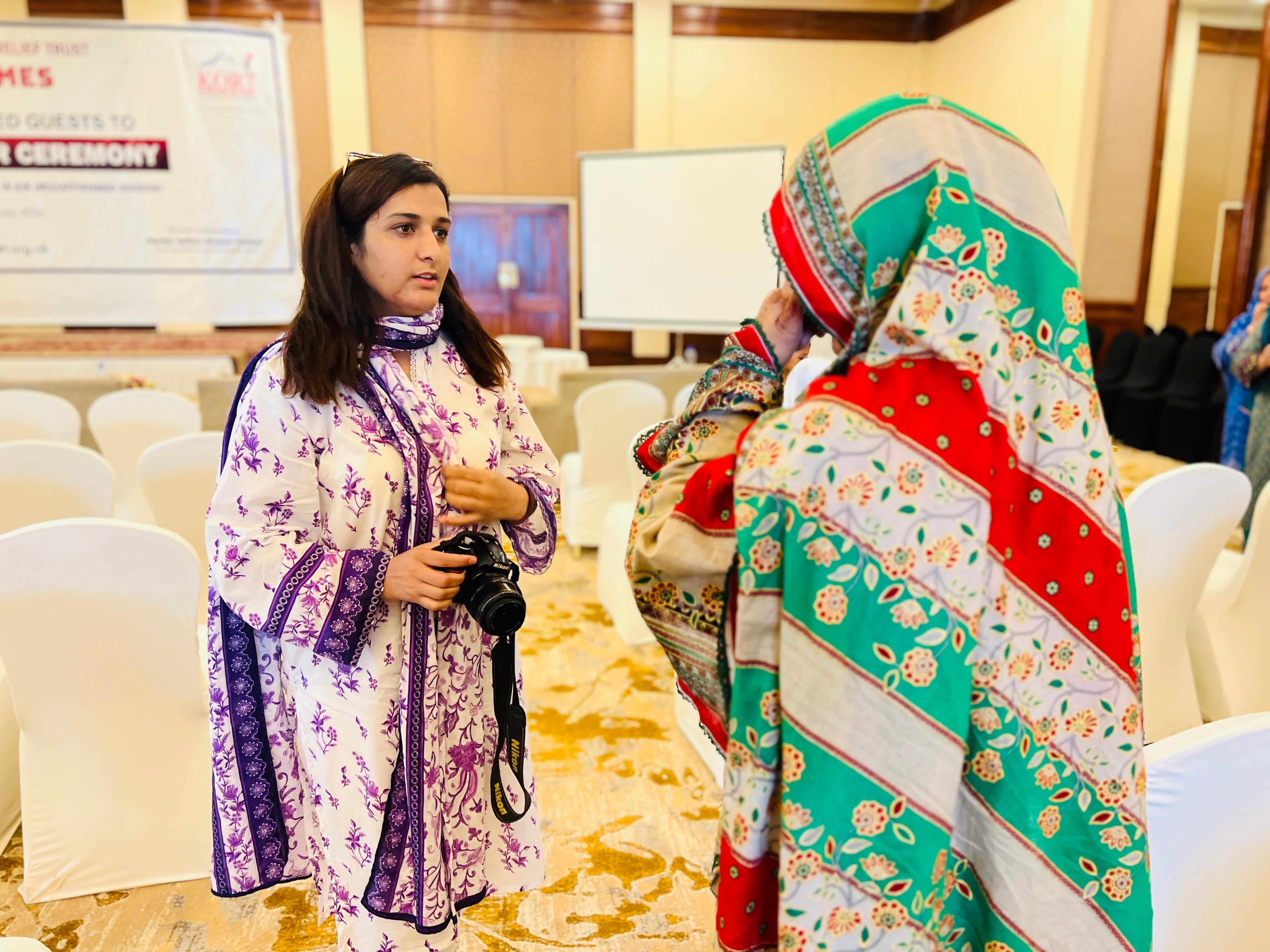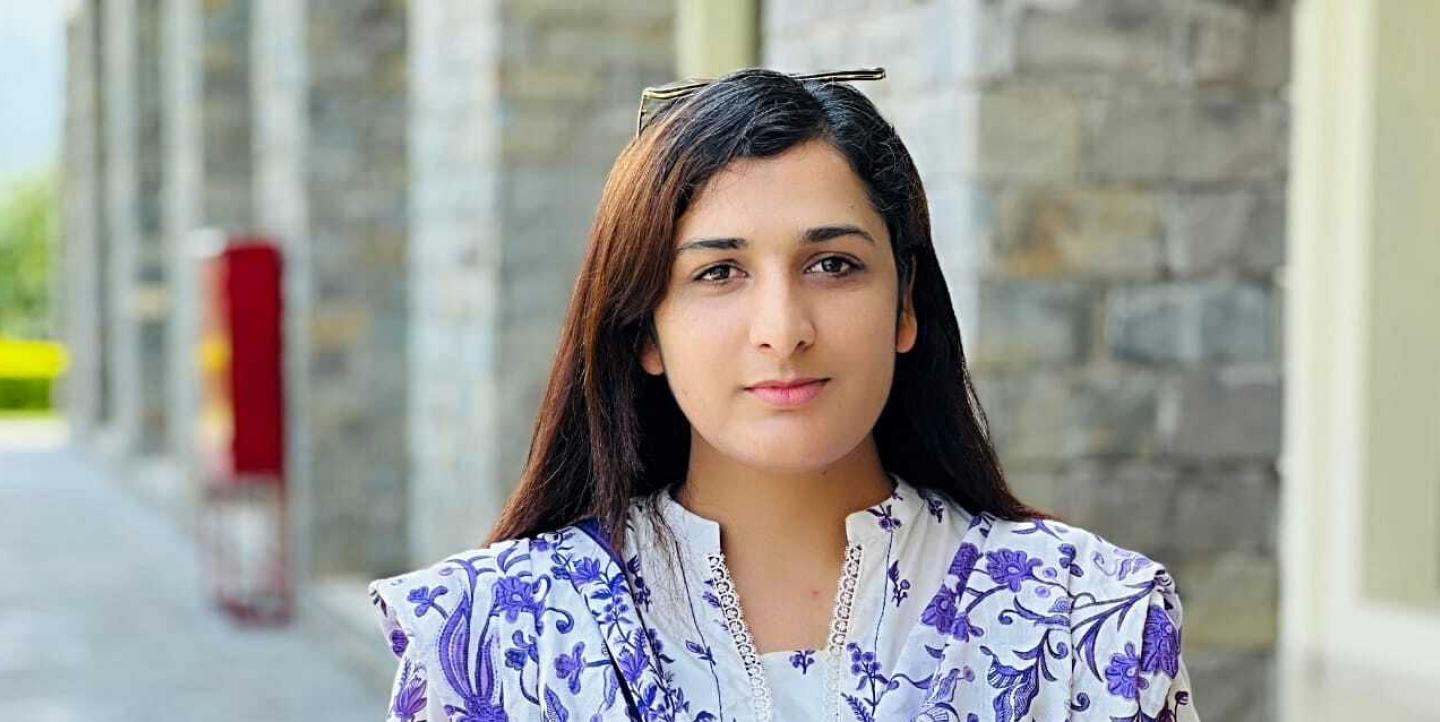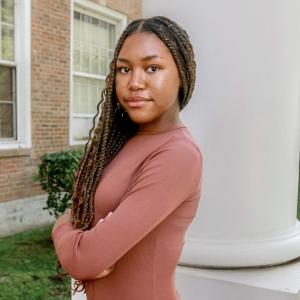Born in Pakistan-administered Azad Jammu and Kashmir, part of a disputed region where women lack fundamental resources and rights, Faiza Gillani decided at a young age she wanted to highlight underrepresented voices in her region through journalism.
“My early career as a journalist in Azad Kashmir was driven by a deep desire to raise the voices and issues of Kashmiri women,” she said.
Gillani started her career in 2014 as a reporter for a local media outlet, Capital News, where she said her colleagues questioned her decision to pursue journalism in a male-dominated field. Despite the skepticism from her peers, she persisted, including in the face of attacks and threats she received for her reporting.
“This personal experience made me acutely aware of the disparities in educational and professional opportunities for women in Kashmir, inspiring me to advocate for gender equality and to use my platform to shed light on the issues affecting women in the region,” said Gillani.
She credits her father for motivating her to follow her passion for journalism. “My father’s support empowered me to pursue journalism as a means of amplifying those voices and highlighting the challenges women face,” she said. “Ultimately, my father's belief in the transformative power of education motivated me to challenge societal norms and work towards creating a more equitable and just society for women in Kashmir.”
Gillani has since become one of the first women in Azad Kashmir working in international media. Today, she works as a freelance correspondent for DW Urdu.
I spoke with Gillani about her career as a woman journalist in Azad Kashmir, the challenges she has faced, and her commitment to producing impactful journalism:
What obstacles have you faced during your career?
I faced significant challenges, particularly regarding acceptance [as a woman in journalism]. Initially, no one was willing to acknowledge me as a journalist. After my first story on harassment of female students at the University of AJK, I received numerous threats and pressure from authorities, urging me to stop my work. A year after this story, my car was intentionally hit, causing severe injuries in an attempt to halt my journalism career.
Male colleagues and society often questioned my place in journalism, suggesting that being a woman and the only one in this profession, I was out of place. Despite these obstacles, I stayed committed.
Recently, on May 24, after attending a prize distribution ceremony organized by NCSW and UNICEF in Islamabad, my car was hit by an unregistered [Toyota] Hiace in [the city of] Murree while I was returning to Muzaffarabad. This attack resulted in injuries to my forehead, neck, and face, requiring face surgery and ongoing bed rest as advised by my doctor. I submitted an application to the Murree police station to investigate the incident, but they refused to accept it.
Earlier in the same month, on May 11, unknown individuals came to my home and threatened me and my family. They warned me not to report the threats to the police.
What reporting of yours are you most proud of?
One of the most impactful stories I produced was a video about Hindu temples in Muzaffarabad. Before partition, Pakistani Kashmir had a Hindu majority, and many religious sites from that era still exist. However, these sites were being encroached upon by individuals with political influence.
My video brought attention to this issue, prompting the Department of Tourism and Archaeology to take action and stop the encroachment. They are now working to preserve these significant Hindu sites. This story was meaningful to me because it led to concrete action and the protection of cultural heritage.
I was inspired to produce this video because religious freedom and respect for places of worship are essential for a peaceful society. Temples are important to our cultural heritage and their deteriorating condition is a significant concern.
How have you benefited from IJNet?
IJNet has been instrumental in my career by providing access to valuable resources, opportunities and training programs. The platform has helped me stay updated with the latest journalism trends and techniques, enhancing my reporting skills and broadening my professional network.
As an alum of ICFJ’s Empowering the Truth [Summit], I gained critical skills in countering disinformation, and fact-checking. These trainings significantly bolstered my ability to produce impactful stories and navigate the challenges of journalism in a complex region like Azad Kashmir. The knowledge and skills acquired from these programs have been crucial in advancing my career and making a meaningful impact through my work.

What are your future goals?
In Azad Kashmir and internationally, I hope my journalism will amplify the voices of marginalized communities, particularly focusing on gender-based violence, climate change and minority rights. By bringing these critical issues to light, I aim to drive awareness, foster dialogue, and promote positive change and accountability.
My future goals include producing stories that lead to tangible societal improvements, expanding my reach to a broader international audience, and mentoring aspiring journalists, especially women, to empower them to pursue their passions and navigate the field's challenges. Ultimately, I aspire to contribute to a more informed and equitable world through my work.
As an IVLP Impact Award recipient, I plan to launch a three-month training fellowship in Azad Kashmir with the theme “Truth Matters: Empowering Journalists through Digital Storytelling and Fact-Checking.” The fellowship aims to support and train aspiring journalists in the region, providing them with the skills and opportunities needed to excel in their careers.
What advice do you have for fellow journalists?
My advice for young journalists, especially women in challenging environments, is to stay determined, never lose hope, and work hard. Keep up with new tools and techniques, uphold ethical standards, and maintain self-respect and dignity. Advocate for the marginalized, regardless of race, religion, color or gender.
Success comes from dedication and adherence to core principles.
Photos courtesy of Faiza Gillani.


